Entrepreneurial Ventures, Impact on Economy, Skills Report
VerifiedAdded on 2023/01/06
|12
|4217
|88
Report
AI Summary
This report delves into the multifaceted world of entrepreneurial ventures, examining various types such as private, public, and voluntary firms, along with high-growth, survival, and high-tech enterprises. It explores the differences and similarities between these ventures, emphasizing time management and resource allocation for innovation and growth. The report highlights the significant impact of small and micro businesses on local, regional, and national economies, detailing their contributions to employment, competition, and innovation. It also discusses the importance of small businesses and startups in the social economy, including their role in providing platforms for selling products and services, creating employment opportunities, and fostering entrepreneurship development. Furthermore, the report identifies the traits and skills of successful entrepreneurs, such as motivation, hard work, and adaptability, and examines how entrepreneurial personality reflects motivation and mindset. Finally, it considers environmental factors that either hinder or foster entrepreneurship, providing a comprehensive overview of the entrepreneurial landscape.

Assignment / Essay
Paraphrase This Document
Need a fresh take? Get an instant paraphrase of this document with our AI Paraphraser
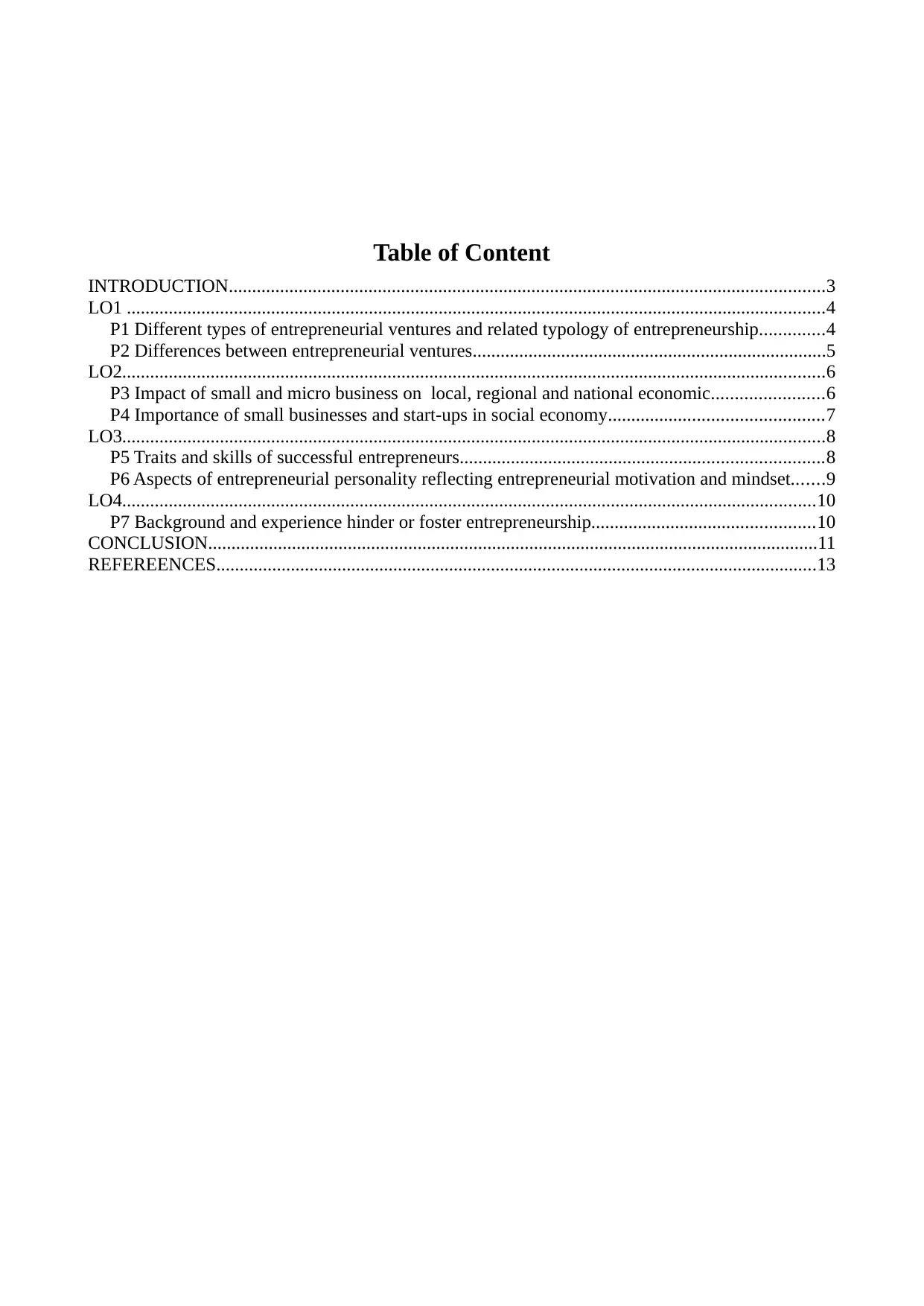
Table of Content
INTRODUCTION................................................................................................................................3
LO1 ......................................................................................................................................................4
P1 Different types of entrepreneurial ventures and related typology of entrepreneurship..............4
P2 Differences between entrepreneurial ventures............................................................................5
LO2.......................................................................................................................................................6
P3 Impact of small and micro business on local, regional and national economic........................6
P4 Importance of small businesses and start-ups in social economy..............................................7
LO3.......................................................................................................................................................8
P5 Traits and skills of successful entrepreneurs..............................................................................8
P6 Aspects of entrepreneurial personality reflecting entrepreneurial motivation and mindset.......9
LO4.....................................................................................................................................................10
P7 Background and experience hinder or foster entrepreneurship................................................10
CONCLUSION...................................................................................................................................11
REFEREENCES.................................................................................................................................13
INTRODUCTION................................................................................................................................3
LO1 ......................................................................................................................................................4
P1 Different types of entrepreneurial ventures and related typology of entrepreneurship..............4
P2 Differences between entrepreneurial ventures............................................................................5
LO2.......................................................................................................................................................6
P3 Impact of small and micro business on local, regional and national economic........................6
P4 Importance of small businesses and start-ups in social economy..............................................7
LO3.......................................................................................................................................................8
P5 Traits and skills of successful entrepreneurs..............................................................................8
P6 Aspects of entrepreneurial personality reflecting entrepreneurial motivation and mindset.......9
LO4.....................................................................................................................................................10
P7 Background and experience hinder or foster entrepreneurship................................................10
CONCLUSION...................................................................................................................................11
REFEREENCES.................................................................................................................................13
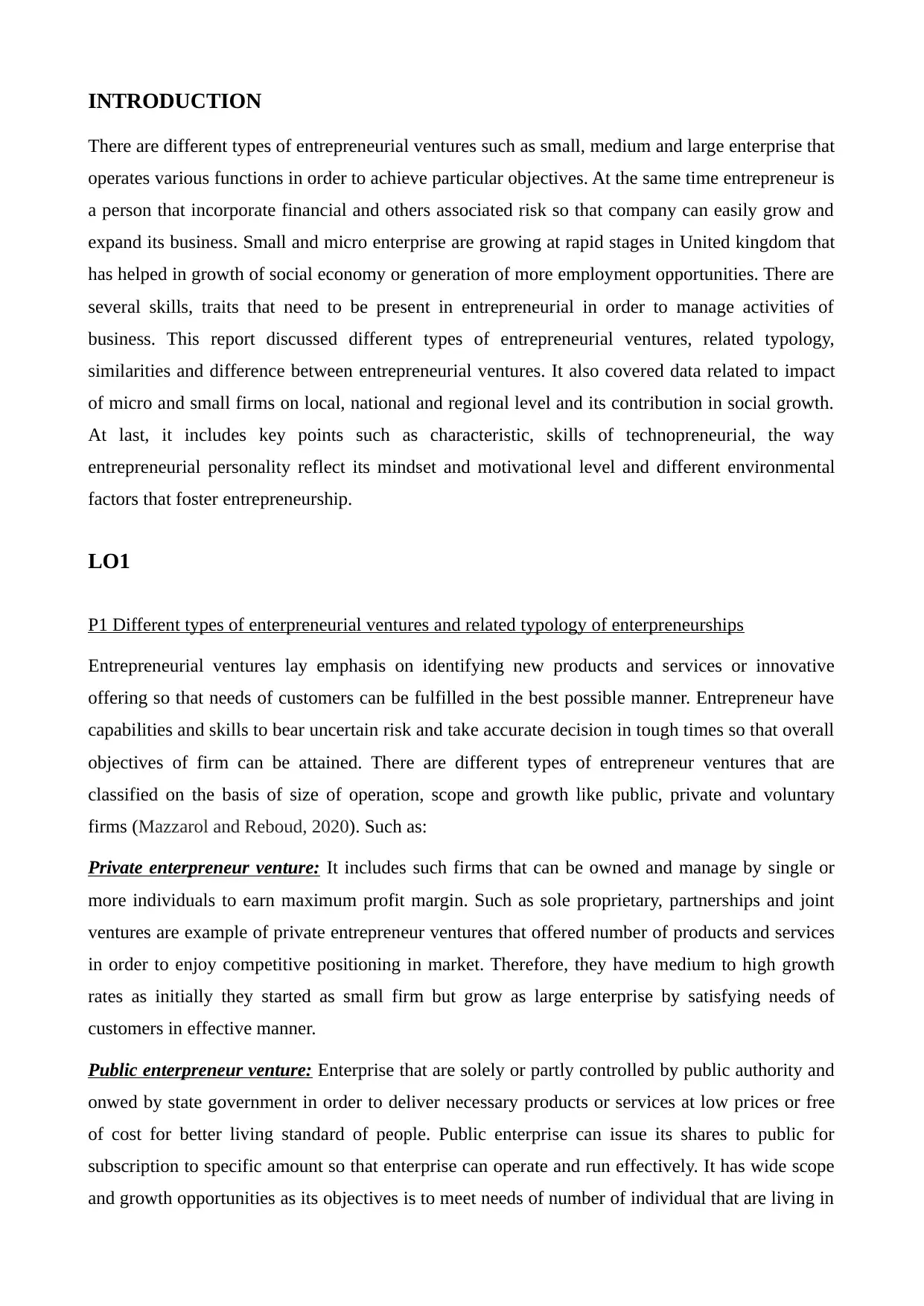
INTRODUCTION
There are different types of entrepreneurial ventures such as small, medium and large enterprise that
operates various functions in order to achieve particular objectives. At the same time entrepreneur is
a person that incorporate financial and others associated risk so that company can easily grow and
expand its business. Small and micro enterprise are growing at rapid stages in United kingdom that
has helped in growth of social economy or generation of more employment opportunities. There are
several skills, traits that need to be present in entrepreneurial in order to manage activities of
business. This report discussed different types of entrepreneurial ventures, related typology,
similarities and difference between entrepreneurial ventures. It also covered data related to impact
of micro and small firms on local, national and regional level and its contribution in social growth.
At last, it includes key points such as characteristic, skills of technopreneurial, the way
entrepreneurial personality reflect its mindset and motivational level and different environmental
factors that foster entrepreneurship.
LO1
P1 Different types of enterpreneurial ventures and related typology of enterpreneurships
Entrepreneurial ventures lay emphasis on identifying new products and services or innovative
offering so that needs of customers can be fulfilled in the best possible manner. Entrepreneur have
capabilities and skills to bear uncertain risk and take accurate decision in tough times so that overall
objectives of firm can be attained. There are different types of entrepreneur ventures that are
classified on the basis of size of operation, scope and growth like public, private and voluntary
firms (Mazzarol and Reboud, 2020). Such as:
Private enterpreneur venture: It includes such firms that can be owned and manage by single or
more individuals to earn maximum profit margin. Such as sole proprietary, partnerships and joint
ventures are example of private entrepreneur ventures that offered number of products and services
in order to enjoy competitive positioning in market. Therefore, they have medium to high growth
rates as initially they started as small firm but grow as large enterprise by satisfying needs of
customers in effective manner.
Public enterpreneur venture: Enterprise that are solely or partly controlled by public authority and
onwed by state government in order to deliver necessary products or services at low prices or free
of cost for better living standard of people. Public enterprise can issue its shares to public for
subscription to specific amount so that enterprise can operate and run effectively. It has wide scope
and growth opportunities as its objectives is to meet needs of number of individual that are living in
There are different types of entrepreneurial ventures such as small, medium and large enterprise that
operates various functions in order to achieve particular objectives. At the same time entrepreneur is
a person that incorporate financial and others associated risk so that company can easily grow and
expand its business. Small and micro enterprise are growing at rapid stages in United kingdom that
has helped in growth of social economy or generation of more employment opportunities. There are
several skills, traits that need to be present in entrepreneurial in order to manage activities of
business. This report discussed different types of entrepreneurial ventures, related typology,
similarities and difference between entrepreneurial ventures. It also covered data related to impact
of micro and small firms on local, national and regional level and its contribution in social growth.
At last, it includes key points such as characteristic, skills of technopreneurial, the way
entrepreneurial personality reflect its mindset and motivational level and different environmental
factors that foster entrepreneurship.
LO1
P1 Different types of enterpreneurial ventures and related typology of enterpreneurships
Entrepreneurial ventures lay emphasis on identifying new products and services or innovative
offering so that needs of customers can be fulfilled in the best possible manner. Entrepreneur have
capabilities and skills to bear uncertain risk and take accurate decision in tough times so that overall
objectives of firm can be attained. There are different types of entrepreneur ventures that are
classified on the basis of size of operation, scope and growth like public, private and voluntary
firms (Mazzarol and Reboud, 2020). Such as:
Private enterpreneur venture: It includes such firms that can be owned and manage by single or
more individuals to earn maximum profit margin. Such as sole proprietary, partnerships and joint
ventures are example of private entrepreneur ventures that offered number of products and services
in order to enjoy competitive positioning in market. Therefore, they have medium to high growth
rates as initially they started as small firm but grow as large enterprise by satisfying needs of
customers in effective manner.
Public enterpreneur venture: Enterprise that are solely or partly controlled by public authority and
onwed by state government in order to deliver necessary products or services at low prices or free
of cost for better living standard of people. Public enterprise can issue its shares to public for
subscription to specific amount so that enterprise can operate and run effectively. It has wide scope
and growth opportunities as its objectives is to meet needs of number of individual that are living in
⊘ This is a preview!⊘
Do you want full access?
Subscribe today to unlock all pages.

Trusted by 1+ million students worldwide
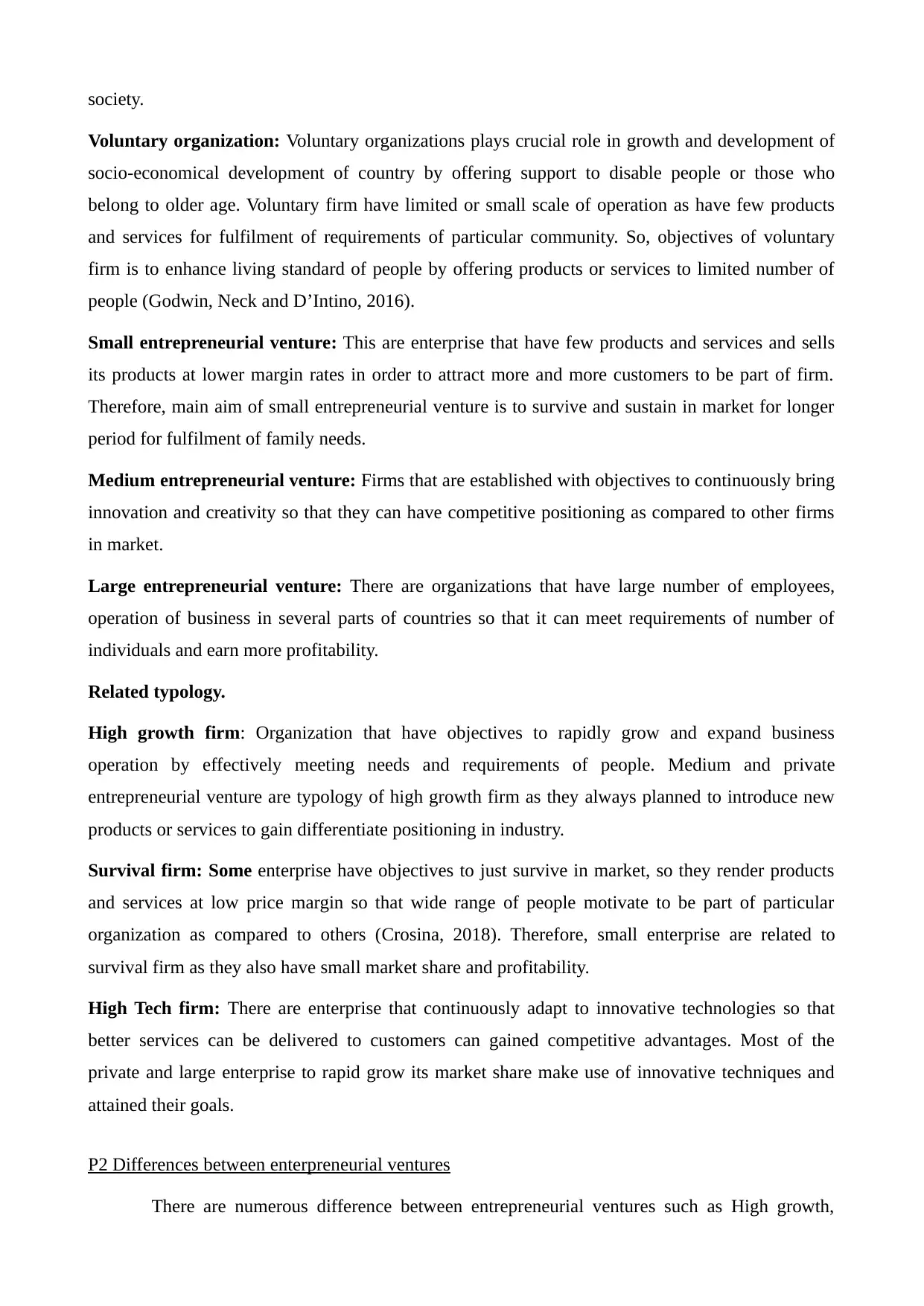
society.
Voluntary organization: Voluntary organizations plays crucial role in growth and development of
socio-economical development of country by offering support to disable people or those who
belong to older age. Voluntary firm have limited or small scale of operation as have few products
and services for fulfilment of requirements of particular community. So, objectives of voluntary
firm is to enhance living standard of people by offering products or services to limited number of
people (Godwin, Neck and D’Intino, 2016).
Small entrepreneurial venture: This are enterprise that have few products and services and sells
its products at lower margin rates in order to attract more and more customers to be part of firm.
Therefore, main aim of small entrepreneurial venture is to survive and sustain in market for longer
period for fulfilment of family needs.
Medium entrepreneurial venture: Firms that are established with objectives to continuously bring
innovation and creativity so that they can have competitive positioning as compared to other firms
in market.
Large entrepreneurial venture: There are organizations that have large number of employees,
operation of business in several parts of countries so that it can meet requirements of number of
individuals and earn more profitability.
Related typology.
High growth firm: Organization that have objectives to rapidly grow and expand business
operation by effectively meeting needs and requirements of people. Medium and private
entrepreneurial venture are typology of high growth firm as they always planned to introduce new
products or services to gain differentiate positioning in industry.
Survival firm: Some enterprise have objectives to just survive in market, so they render products
and services at low price margin so that wide range of people motivate to be part of particular
organization as compared to others (Crosina, 2018). Therefore, small enterprise are related to
survival firm as they also have small market share and profitability.
High Tech firm: There are enterprise that continuously adapt to innovative technologies so that
better services can be delivered to customers can gained competitive advantages. Most of the
private and large enterprise to rapid grow its market share make use of innovative techniques and
attained their goals.
P2 Differences between enterpreneurial ventures
There are numerous difference between entrepreneurial ventures such as High growth,
Voluntary organization: Voluntary organizations plays crucial role in growth and development of
socio-economical development of country by offering support to disable people or those who
belong to older age. Voluntary firm have limited or small scale of operation as have few products
and services for fulfilment of requirements of particular community. So, objectives of voluntary
firm is to enhance living standard of people by offering products or services to limited number of
people (Godwin, Neck and D’Intino, 2016).
Small entrepreneurial venture: This are enterprise that have few products and services and sells
its products at lower margin rates in order to attract more and more customers to be part of firm.
Therefore, main aim of small entrepreneurial venture is to survive and sustain in market for longer
period for fulfilment of family needs.
Medium entrepreneurial venture: Firms that are established with objectives to continuously bring
innovation and creativity so that they can have competitive positioning as compared to other firms
in market.
Large entrepreneurial venture: There are organizations that have large number of employees,
operation of business in several parts of countries so that it can meet requirements of number of
individuals and earn more profitability.
Related typology.
High growth firm: Organization that have objectives to rapidly grow and expand business
operation by effectively meeting needs and requirements of people. Medium and private
entrepreneurial venture are typology of high growth firm as they always planned to introduce new
products or services to gain differentiate positioning in industry.
Survival firm: Some enterprise have objectives to just survive in market, so they render products
and services at low price margin so that wide range of people motivate to be part of particular
organization as compared to others (Crosina, 2018). Therefore, small enterprise are related to
survival firm as they also have small market share and profitability.
High Tech firm: There are enterprise that continuously adapt to innovative technologies so that
better services can be delivered to customers can gained competitive advantages. Most of the
private and large enterprise to rapid grow its market share make use of innovative techniques and
attained their goals.
P2 Differences between enterpreneurial ventures
There are numerous difference between entrepreneurial ventures such as High growth,
Paraphrase This Document
Need a fresh take? Get an instant paraphrase of this document with our AI Paraphraser
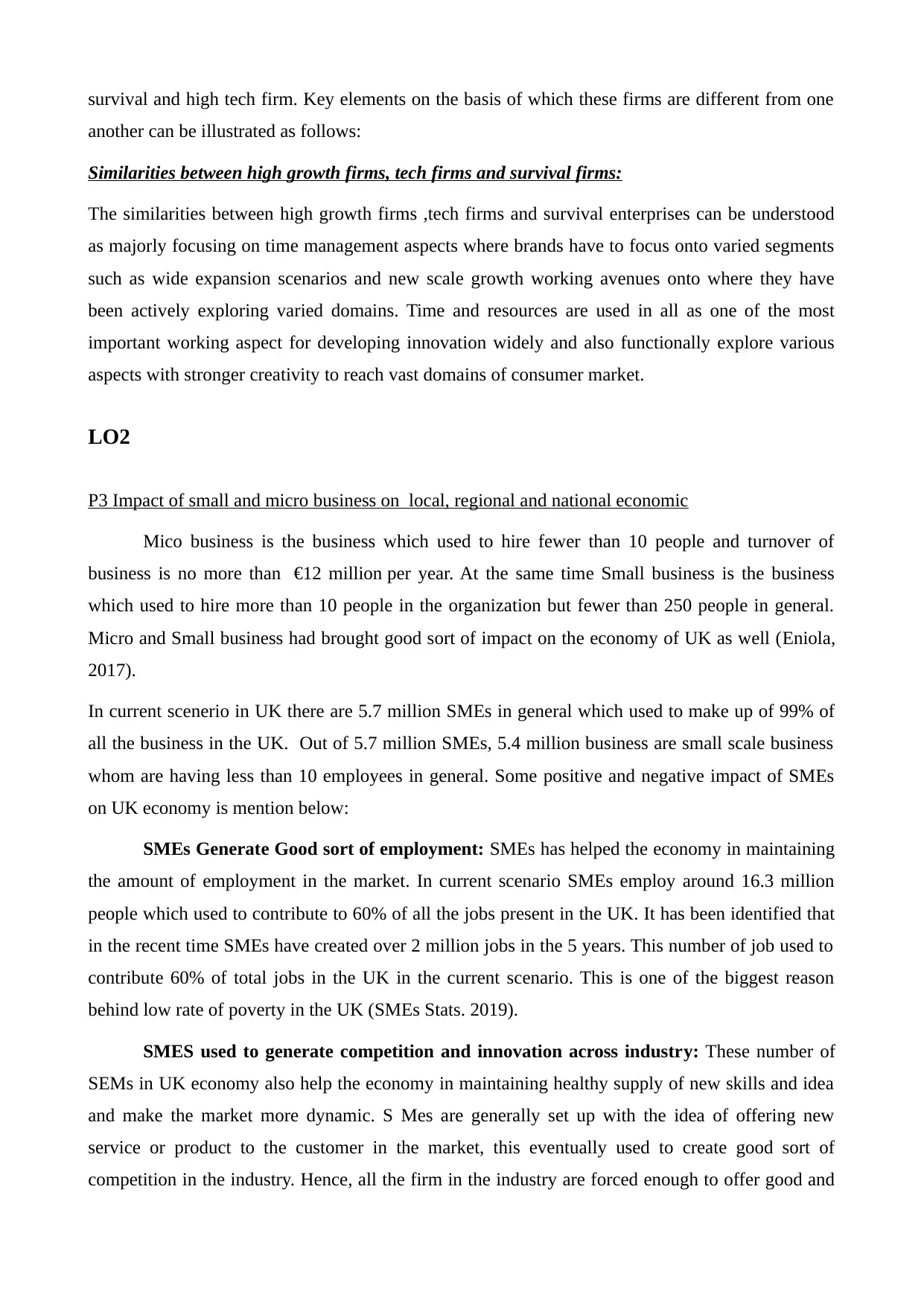
survival and high tech firm. Key elements on the basis of which these firms are different from one
another can be illustrated as follows:
Similarities between high growth firms, tech firms and survival firms:
The similarities between high growth firms ,tech firms and survival enterprises can be understood
as majorly focusing on time management aspects where brands have to focus onto varied segments
such as wide expansion scenarios and new scale growth working avenues onto where they have
been actively exploring varied domains. Time and resources are used in all as one of the most
important working aspect for developing innovation widely and also functionally explore various
aspects with stronger creativity to reach vast domains of consumer market.
LO2
P3 Impact of small and micro business on local, regional and national economic
Mico business is the business which used to hire fewer than 10 people and turnover of
business is no more than €12 million per year. At the same time Small business is the business
which used to hire more than 10 people in the organization but fewer than 250 people in general.
Micro and Small business had brought good sort of impact on the economy of UK as well (Eniola,
2017).
In current scenerio in UK there are 5.7 million SMEs in general which used to make up of 99% of
all the business in the UK. Out of 5.7 million SMEs, 5.4 million business are small scale business
whom are having less than 10 employees in general. Some positive and negative impact of SMEs
on UK economy is mention below:
SMEs Generate Good sort of employment: SMEs has helped the economy in maintaining
the amount of employment in the market. In current scenario SMEs employ around 16.3 million
people which used to contribute to 60% of all the jobs present in the UK. It has been identified that
in the recent time SMEs have created over 2 million jobs in the 5 years. This number of job used to
contribute 60% of total jobs in the UK in the current scenario. This is one of the biggest reason
behind low rate of poverty in the UK (SMEs Stats. 2019).
SMES used to generate competition and innovation across industry: These number of
SEMs in UK economy also help the economy in maintaining healthy supply of new skills and idea
and make the market more dynamic. S Mes are generally set up with the idea of offering new
service or product to the customer in the market, this eventually used to create good sort of
competition in the industry. Hence, all the firm in the industry are forced enough to offer good and
another can be illustrated as follows:
Similarities between high growth firms, tech firms and survival firms:
The similarities between high growth firms ,tech firms and survival enterprises can be understood
as majorly focusing on time management aspects where brands have to focus onto varied segments
such as wide expansion scenarios and new scale growth working avenues onto where they have
been actively exploring varied domains. Time and resources are used in all as one of the most
important working aspect for developing innovation widely and also functionally explore various
aspects with stronger creativity to reach vast domains of consumer market.
LO2
P3 Impact of small and micro business on local, regional and national economic
Mico business is the business which used to hire fewer than 10 people and turnover of
business is no more than €12 million per year. At the same time Small business is the business
which used to hire more than 10 people in the organization but fewer than 250 people in general.
Micro and Small business had brought good sort of impact on the economy of UK as well (Eniola,
2017).
In current scenerio in UK there are 5.7 million SMEs in general which used to make up of 99% of
all the business in the UK. Out of 5.7 million SMEs, 5.4 million business are small scale business
whom are having less than 10 employees in general. Some positive and negative impact of SMEs
on UK economy is mention below:
SMEs Generate Good sort of employment: SMEs has helped the economy in maintaining
the amount of employment in the market. In current scenario SMEs employ around 16.3 million
people which used to contribute to 60% of all the jobs present in the UK. It has been identified that
in the recent time SMEs have created over 2 million jobs in the 5 years. This number of job used to
contribute 60% of total jobs in the UK in the current scenario. This is one of the biggest reason
behind low rate of poverty in the UK (SMEs Stats. 2019).
SMES used to generate competition and innovation across industry: These number of
SEMs in UK economy also help the economy in maintaining healthy supply of new skills and idea
and make the market more dynamic. S Mes are generally set up with the idea of offering new
service or product to the customer in the market, this eventually used to create good sort of
competition in the industry. Hence, all the firm in the industry are forced enough to offer good and
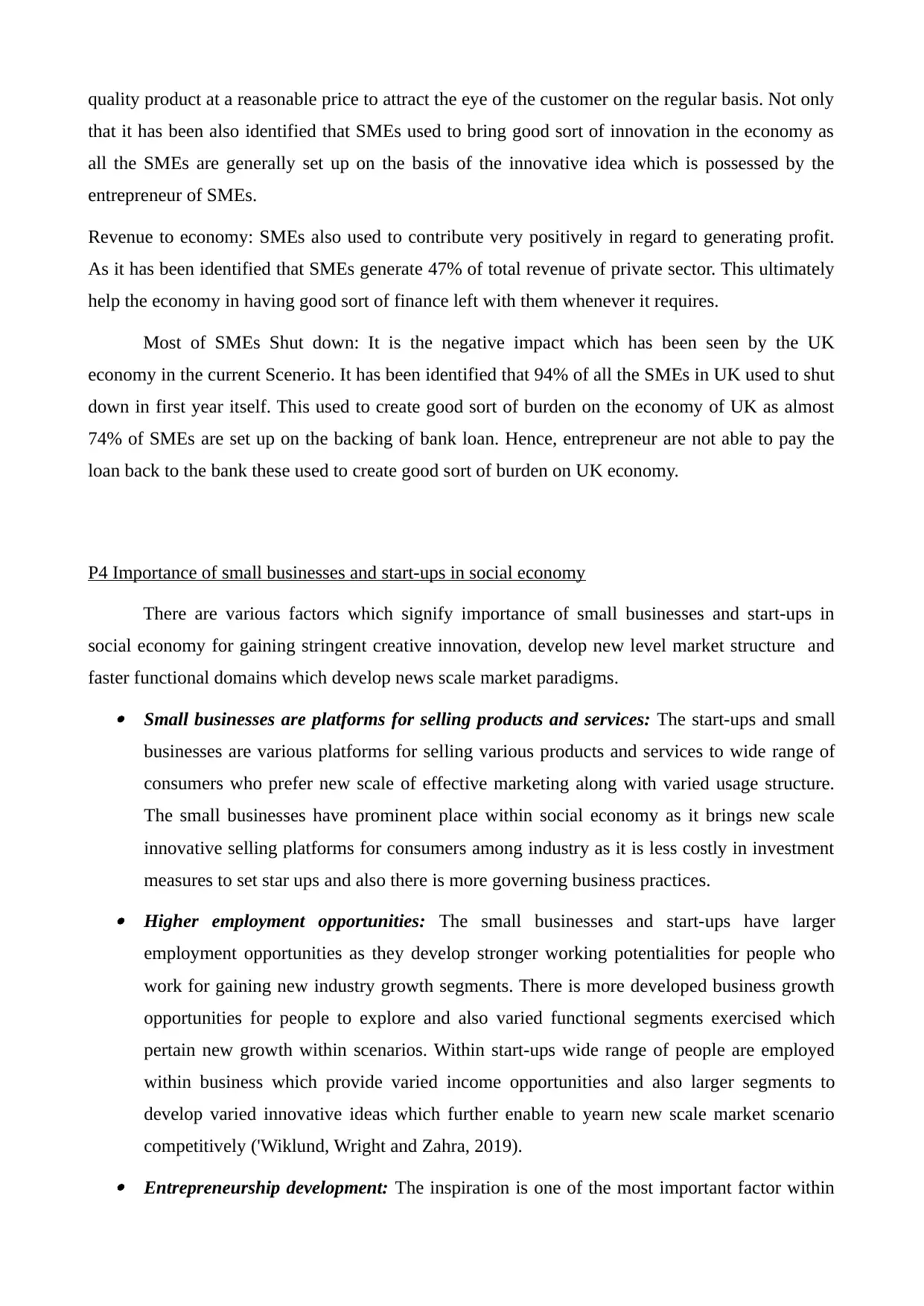
quality product at a reasonable price to attract the eye of the customer on the regular basis. Not only
that it has been also identified that SMEs used to bring good sort of innovation in the economy as
all the SMEs are generally set up on the basis of the innovative idea which is possessed by the
entrepreneur of SMEs.
Revenue to economy: SMEs also used to contribute very positively in regard to generating profit.
As it has been identified that SMEs generate 47% of total revenue of private sector. This ultimately
help the economy in having good sort of finance left with them whenever it requires.
Most of SMEs Shut down: It is the negative impact which has been seen by the UK
economy in the current Scenerio. It has been identified that 94% of all the SMEs in UK used to shut
down in first year itself. This used to create good sort of burden on the economy of UK as almost
74% of SMEs are set up on the backing of bank loan. Hence, entrepreneur are not able to pay the
loan back to the bank these used to create good sort of burden on UK economy.
P4 Importance of small businesses and start-ups in social economy
There are various factors which signify importance of small businesses and start-ups in
social economy for gaining stringent creative innovation, develop new level market structure and
faster functional domains which develop news scale market paradigms.
Small businesses are platforms for selling products and services: The start-ups and small
businesses are various platforms for selling various products and services to wide range of
consumers who prefer new scale of effective marketing along with varied usage structure.
The small businesses have prominent place within social economy as it brings new scale
innovative selling platforms for consumers among industry as it is less costly in investment
measures to set star ups and also there is more governing business practices.
Higher employment opportunities: The small businesses and start-ups have larger
employment opportunities as they develop stronger working potentialities for people who
work for gaining new industry growth segments. There is more developed business growth
opportunities for people to explore and also varied functional segments exercised which
pertain new growth within scenarios. Within start-ups wide range of people are employed
within business which provide varied income opportunities and also larger segments to
develop varied innovative ideas which further enable to yearn new scale market scenario
competitively ('Wiklund, Wright and Zahra, 2019).
Entrepreneurship development: The inspiration is one of the most important factor within
that it has been also identified that SMEs used to bring good sort of innovation in the economy as
all the SMEs are generally set up on the basis of the innovative idea which is possessed by the
entrepreneur of SMEs.
Revenue to economy: SMEs also used to contribute very positively in regard to generating profit.
As it has been identified that SMEs generate 47% of total revenue of private sector. This ultimately
help the economy in having good sort of finance left with them whenever it requires.
Most of SMEs Shut down: It is the negative impact which has been seen by the UK
economy in the current Scenerio. It has been identified that 94% of all the SMEs in UK used to shut
down in first year itself. This used to create good sort of burden on the economy of UK as almost
74% of SMEs are set up on the backing of bank loan. Hence, entrepreneur are not able to pay the
loan back to the bank these used to create good sort of burden on UK economy.
P4 Importance of small businesses and start-ups in social economy
There are various factors which signify importance of small businesses and start-ups in
social economy for gaining stringent creative innovation, develop new level market structure and
faster functional domains which develop news scale market paradigms.
Small businesses are platforms for selling products and services: The start-ups and small
businesses are various platforms for selling various products and services to wide range of
consumers who prefer new scale of effective marketing along with varied usage structure.
The small businesses have prominent place within social economy as it brings new scale
innovative selling platforms for consumers among industry as it is less costly in investment
measures to set star ups and also there is more governing business practices.
Higher employment opportunities: The small businesses and start-ups have larger
employment opportunities as they develop stronger working potentialities for people who
work for gaining new industry growth segments. There is more developed business growth
opportunities for people to explore and also varied functional segments exercised which
pertain new growth within scenarios. Within start-ups wide range of people are employed
within business which provide varied income opportunities and also larger segments to
develop varied innovative ideas which further enable to yearn new scale market scenario
competitively ('Wiklund, Wright and Zahra, 2019).
Entrepreneurship development: The inspiration is one of the most important factor within
⊘ This is a preview!⊘
Do you want full access?
Subscribe today to unlock all pages.

Trusted by 1+ million students worldwide
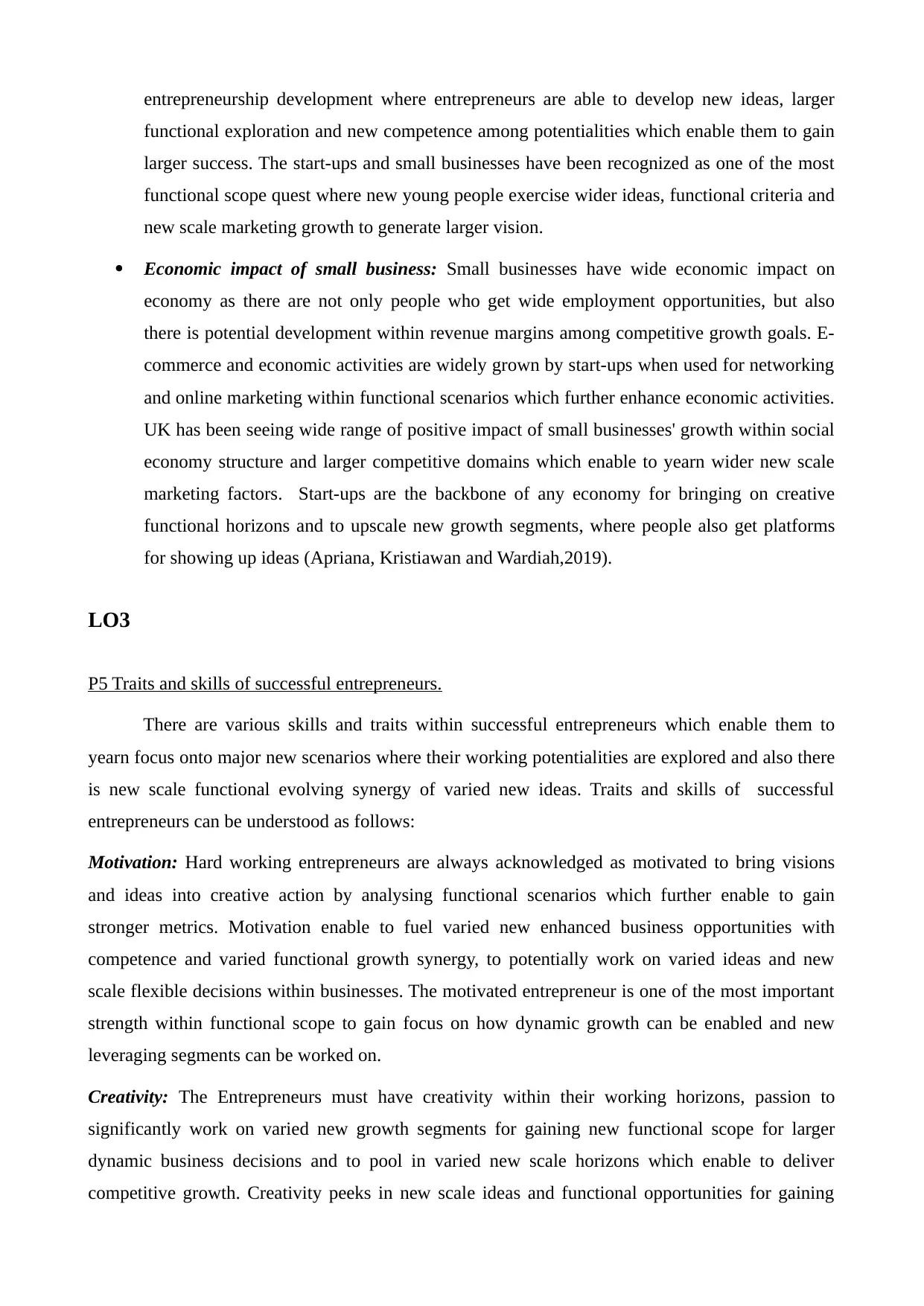
entrepreneurship development where entrepreneurs are able to develop new ideas, larger
functional exploration and new competence among potentialities which enable them to gain
larger success. The start-ups and small businesses have been recognized as one of the most
functional scope quest where new young people exercise wider ideas, functional criteria and
new scale marketing growth to generate larger vision.
Economic impact of small business: Small businesses have wide economic impact on
economy as there are not only people who get wide employment opportunities, but also
there is potential development within revenue margins among competitive growth goals. E-
commerce and economic activities are widely grown by start-ups when used for networking
and online marketing within functional scenarios which further enhance economic activities.
UK has been seeing wide range of positive impact of small businesses' growth within social
economy structure and larger competitive domains which enable to yearn wider new scale
marketing factors. Start-ups are the backbone of any economy for bringing on creative
functional horizons and to upscale new growth segments, where people also get platforms
for showing up ideas (Apriana, Kristiawan and Wardiah,2019).
LO3
P5 Traits and skills of successful entrepreneurs.
There are various skills and traits within successful entrepreneurs which enable them to
yearn focus onto major new scenarios where their working potentialities are explored and also there
is new scale functional evolving synergy of varied new ideas. Traits and skills of successful
entrepreneurs can be understood as follows:
Motivation: Hard working entrepreneurs are always acknowledged as motivated to bring visions
and ideas into creative action by analysing functional scenarios which further enable to gain
stronger metrics. Motivation enable to fuel varied new enhanced business opportunities with
competence and varied functional growth synergy, to potentially work on varied ideas and new
scale flexible decisions within businesses. The motivated entrepreneur is one of the most important
strength within functional scope to gain focus on how dynamic growth can be enabled and new
leveraging segments can be worked on.
Creativity: The Entrepreneurs must have creativity within their working horizons, passion to
significantly work on varied new growth segments for gaining new functional scope for larger
dynamic business decisions and to pool in varied new scale horizons which enable to deliver
competitive growth. Creativity peeks in new scale ideas and functional opportunities for gaining
functional exploration and new competence among potentialities which enable them to gain
larger success. The start-ups and small businesses have been recognized as one of the most
functional scope quest where new young people exercise wider ideas, functional criteria and
new scale marketing growth to generate larger vision.
Economic impact of small business: Small businesses have wide economic impact on
economy as there are not only people who get wide employment opportunities, but also
there is potential development within revenue margins among competitive growth goals. E-
commerce and economic activities are widely grown by start-ups when used for networking
and online marketing within functional scenarios which further enhance economic activities.
UK has been seeing wide range of positive impact of small businesses' growth within social
economy structure and larger competitive domains which enable to yearn wider new scale
marketing factors. Start-ups are the backbone of any economy for bringing on creative
functional horizons and to upscale new growth segments, where people also get platforms
for showing up ideas (Apriana, Kristiawan and Wardiah,2019).
LO3
P5 Traits and skills of successful entrepreneurs.
There are various skills and traits within successful entrepreneurs which enable them to
yearn focus onto major new scenarios where their working potentialities are explored and also there
is new scale functional evolving synergy of varied new ideas. Traits and skills of successful
entrepreneurs can be understood as follows:
Motivation: Hard working entrepreneurs are always acknowledged as motivated to bring visions
and ideas into creative action by analysing functional scenarios which further enable to gain
stronger metrics. Motivation enable to fuel varied new enhanced business opportunities with
competence and varied functional growth synergy, to potentially work on varied ideas and new
scale flexible decisions within businesses. The motivated entrepreneur is one of the most important
strength within functional scope to gain focus on how dynamic growth can be enabled and new
leveraging segments can be worked on.
Creativity: The Entrepreneurs must have creativity within their working horizons, passion to
significantly work on varied new growth segments for gaining new functional scope for larger
dynamic business decisions and to pool in varied new scale horizons which enable to deliver
competitive growth. Creativity peeks in new scale ideas and functional opportunities for gaining
Paraphrase This Document
Need a fresh take? Get an instant paraphrase of this document with our AI Paraphraser
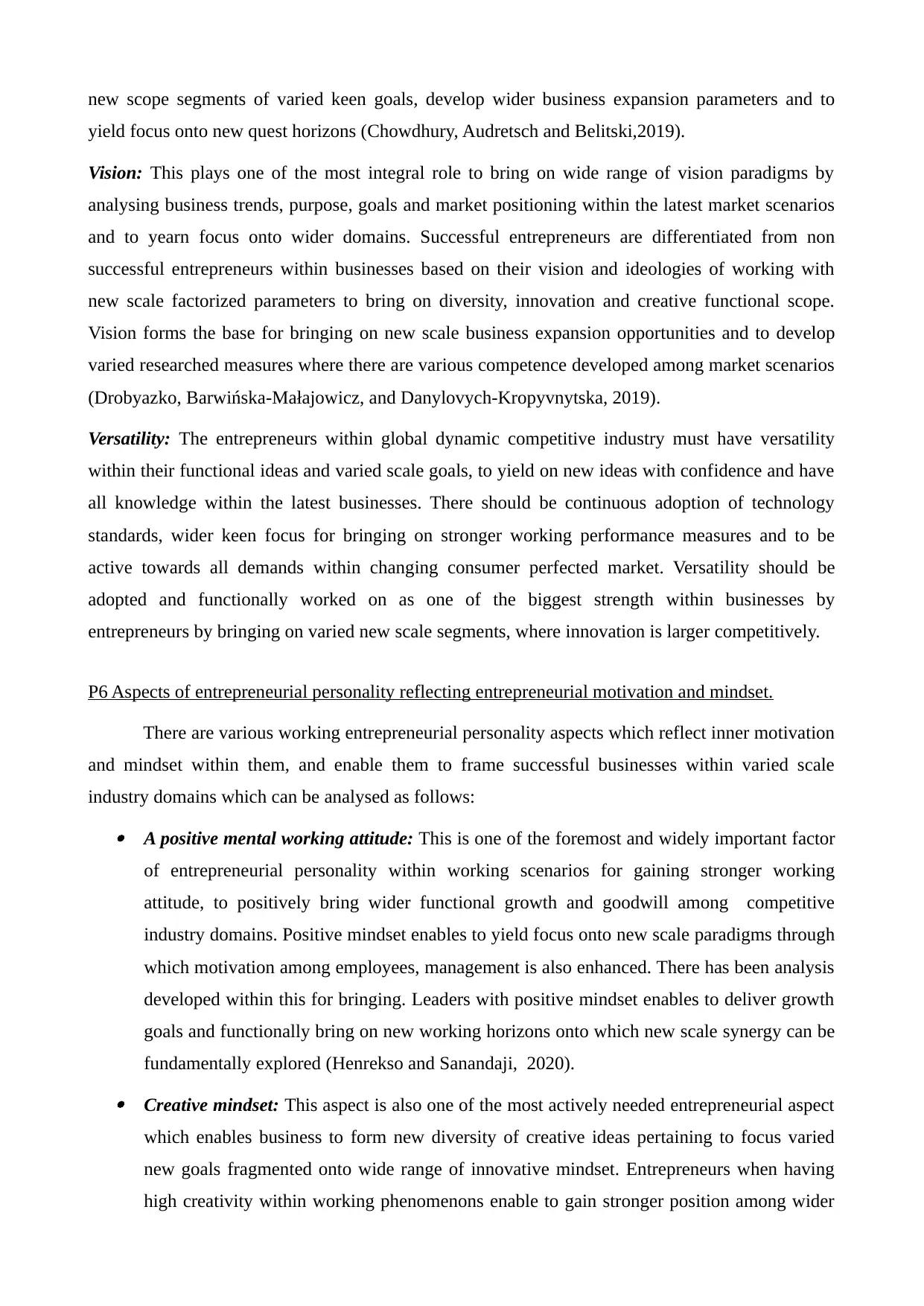
new scope segments of varied keen goals, develop wider business expansion parameters and to
yield focus onto new quest horizons (Chowdhury, Audretsch and Belitski,2019).
Vision: This plays one of the most integral role to bring on wide range of vision paradigms by
analysing business trends, purpose, goals and market positioning within the latest market scenarios
and to yearn focus onto wider domains. Successful entrepreneurs are differentiated from non
successful entrepreneurs within businesses based on their vision and ideologies of working with
new scale factorized parameters to bring on diversity, innovation and creative functional scope.
Vision forms the base for bringing on new scale business expansion opportunities and to develop
varied researched measures where there are various competence developed among market scenarios
(Drobyazko, Barwińska-Małajowicz, and Danylovych-Kropyvnytska, 2019).
Versatility: The entrepreneurs within global dynamic competitive industry must have versatility
within their functional ideas and varied scale goals, to yield on new ideas with confidence and have
all knowledge within the latest businesses. There should be continuous adoption of technology
standards, wider keen focus for bringing on stronger working performance measures and to be
active towards all demands within changing consumer perfected market. Versatility should be
adopted and functionally worked on as one of the biggest strength within businesses by
entrepreneurs by bringing on varied new scale segments, where innovation is larger competitively.
P6 Aspects of entrepreneurial personality reflecting entrepreneurial motivation and mindset.
There are various working entrepreneurial personality aspects which reflect inner motivation
and mindset within them, and enable them to frame successful businesses within varied scale
industry domains which can be analysed as follows:
A positive mental working attitude: This is one of the foremost and widely important factor
of entrepreneurial personality within working scenarios for gaining stronger working
attitude, to positively bring wider functional growth and goodwill among competitive
industry domains. Positive mindset enables to yield focus onto new scale paradigms through
which motivation among employees, management is also enhanced. There has been analysis
developed within this for bringing. Leaders with positive mindset enables to deliver growth
goals and functionally bring on new working horizons onto which new scale synergy can be
fundamentally explored (Henrekso and Sanandaji, 2020).
Creative mindset: This aspect is also one of the most actively needed entrepreneurial aspect
which enables business to form new diversity of creative ideas pertaining to focus varied
new goals fragmented onto wide range of innovative mindset. Entrepreneurs when having
high creativity within working phenomenons enable to gain stronger position among wider
yield focus onto new quest horizons (Chowdhury, Audretsch and Belitski,2019).
Vision: This plays one of the most integral role to bring on wide range of vision paradigms by
analysing business trends, purpose, goals and market positioning within the latest market scenarios
and to yearn focus onto wider domains. Successful entrepreneurs are differentiated from non
successful entrepreneurs within businesses based on their vision and ideologies of working with
new scale factorized parameters to bring on diversity, innovation and creative functional scope.
Vision forms the base for bringing on new scale business expansion opportunities and to develop
varied researched measures where there are various competence developed among market scenarios
(Drobyazko, Barwińska-Małajowicz, and Danylovych-Kropyvnytska, 2019).
Versatility: The entrepreneurs within global dynamic competitive industry must have versatility
within their functional ideas and varied scale goals, to yield on new ideas with confidence and have
all knowledge within the latest businesses. There should be continuous adoption of technology
standards, wider keen focus for bringing on stronger working performance measures and to be
active towards all demands within changing consumer perfected market. Versatility should be
adopted and functionally worked on as one of the biggest strength within businesses by
entrepreneurs by bringing on varied new scale segments, where innovation is larger competitively.
P6 Aspects of entrepreneurial personality reflecting entrepreneurial motivation and mindset.
There are various working entrepreneurial personality aspects which reflect inner motivation
and mindset within them, and enable them to frame successful businesses within varied scale
industry domains which can be analysed as follows:
A positive mental working attitude: This is one of the foremost and widely important factor
of entrepreneurial personality within working scenarios for gaining stronger working
attitude, to positively bring wider functional growth and goodwill among competitive
industry domains. Positive mindset enables to yield focus onto new scale paradigms through
which motivation among employees, management is also enhanced. There has been analysis
developed within this for bringing. Leaders with positive mindset enables to deliver growth
goals and functionally bring on new working horizons onto which new scale synergy can be
fundamentally explored (Henrekso and Sanandaji, 2020).
Creative mindset: This aspect is also one of the most actively needed entrepreneurial aspect
which enables business to form new diversity of creative ideas pertaining to focus varied
new goals fragmented onto wide range of innovative mindset. Entrepreneurs when having
high creativity within working phenomenons enable to gain stronger position among wider
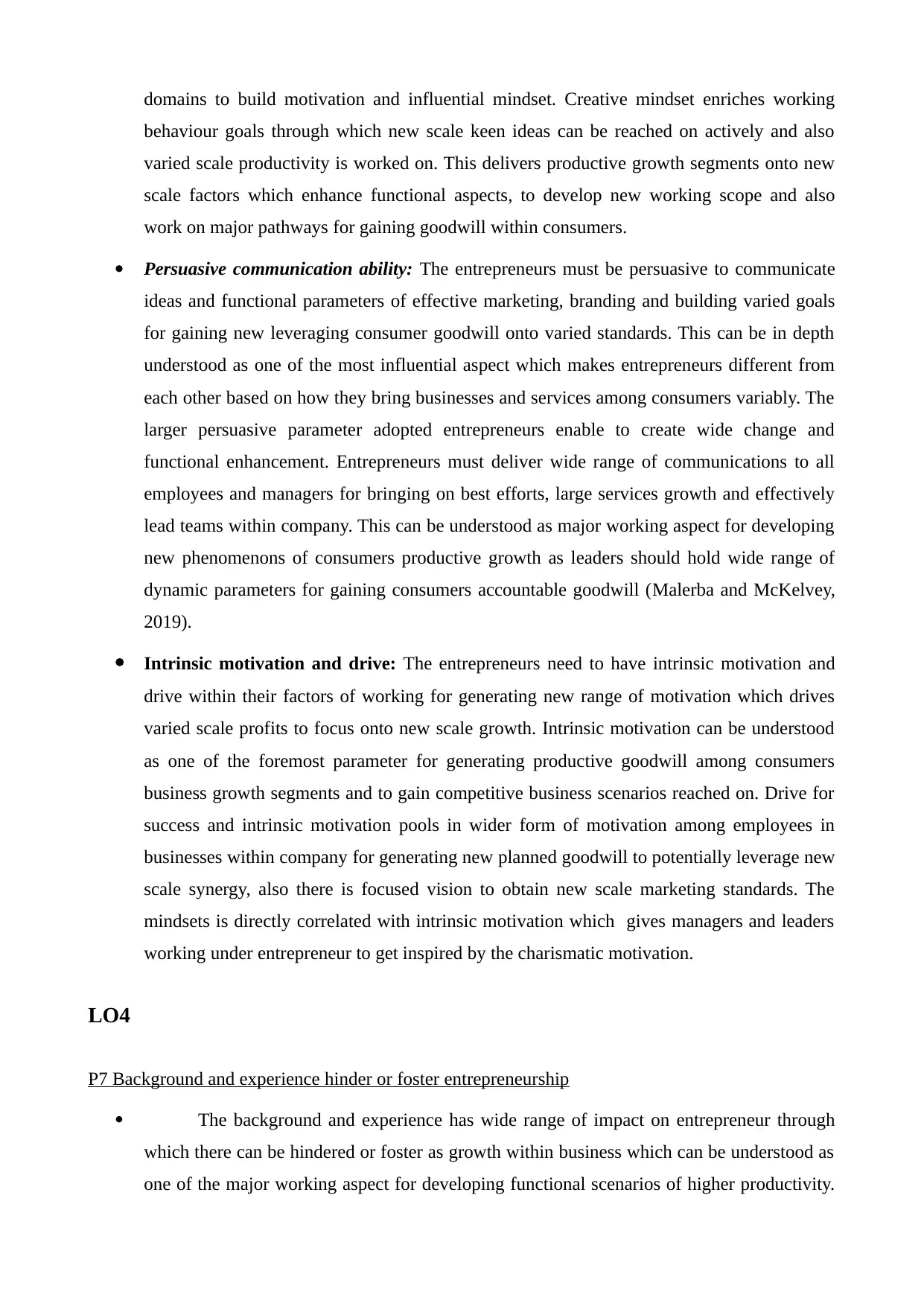
domains to build motivation and influential mindset. Creative mindset enriches working
behaviour goals through which new scale keen ideas can be reached on actively and also
varied scale productivity is worked on. This delivers productive growth segments onto new
scale factors which enhance functional aspects, to develop new working scope and also
work on major pathways for gaining goodwill within consumers.
Persuasive communication ability: The entrepreneurs must be persuasive to communicate
ideas and functional parameters of effective marketing, branding and building varied goals
for gaining new leveraging consumer goodwill onto varied standards. This can be in depth
understood as one of the most influential aspect which makes entrepreneurs different from
each other based on how they bring businesses and services among consumers variably. The
larger persuasive parameter adopted entrepreneurs enable to create wide change and
functional enhancement. Entrepreneurs must deliver wide range of communications to all
employees and managers for bringing on best efforts, large services growth and effectively
lead teams within company. This can be understood as major working aspect for developing
new phenomenons of consumers productive growth as leaders should hold wide range of
dynamic parameters for gaining consumers accountable goodwill (Malerba and McKelvey,
2019).
Intrinsic motivation and drive: The entrepreneurs need to have intrinsic motivation and
drive within their factors of working for generating new range of motivation which drives
varied scale profits to focus onto new scale growth. Intrinsic motivation can be understood
as one of the foremost parameter for generating productive goodwill among consumers
business growth segments and to gain competitive business scenarios reached on. Drive for
success and intrinsic motivation pools in wider form of motivation among employees in
businesses within company for generating new planned goodwill to potentially leverage new
scale synergy, also there is focused vision to obtain new scale marketing standards. The
mindsets is directly correlated with intrinsic motivation which gives managers and leaders
working under entrepreneur to get inspired by the charismatic motivation.
LO4
P7 Background and experience hinder or foster entrepreneurship
The background and experience has wide range of impact on entrepreneur through
which there can be hindered or foster as growth within business which can be understood as
one of the major working aspect for developing functional scenarios of higher productivity.
behaviour goals through which new scale keen ideas can be reached on actively and also
varied scale productivity is worked on. This delivers productive growth segments onto new
scale factors which enhance functional aspects, to develop new working scope and also
work on major pathways for gaining goodwill within consumers.
Persuasive communication ability: The entrepreneurs must be persuasive to communicate
ideas and functional parameters of effective marketing, branding and building varied goals
for gaining new leveraging consumer goodwill onto varied standards. This can be in depth
understood as one of the most influential aspect which makes entrepreneurs different from
each other based on how they bring businesses and services among consumers variably. The
larger persuasive parameter adopted entrepreneurs enable to create wide change and
functional enhancement. Entrepreneurs must deliver wide range of communications to all
employees and managers for bringing on best efforts, large services growth and effectively
lead teams within company. This can be understood as major working aspect for developing
new phenomenons of consumers productive growth as leaders should hold wide range of
dynamic parameters for gaining consumers accountable goodwill (Malerba and McKelvey,
2019).
Intrinsic motivation and drive: The entrepreneurs need to have intrinsic motivation and
drive within their factors of working for generating new range of motivation which drives
varied scale profits to focus onto new scale growth. Intrinsic motivation can be understood
as one of the foremost parameter for generating productive goodwill among consumers
business growth segments and to gain competitive business scenarios reached on. Drive for
success and intrinsic motivation pools in wider form of motivation among employees in
businesses within company for generating new planned goodwill to potentially leverage new
scale synergy, also there is focused vision to obtain new scale marketing standards. The
mindsets is directly correlated with intrinsic motivation which gives managers and leaders
working under entrepreneur to get inspired by the charismatic motivation.
LO4
P7 Background and experience hinder or foster entrepreneurship
The background and experience has wide range of impact on entrepreneur through
which there can be hindered or foster as growth within business which can be understood as
one of the major working aspect for developing functional scenarios of higher productivity.
⊘ This is a preview!⊘
Do you want full access?
Subscribe today to unlock all pages.

Trusted by 1+ million students worldwide
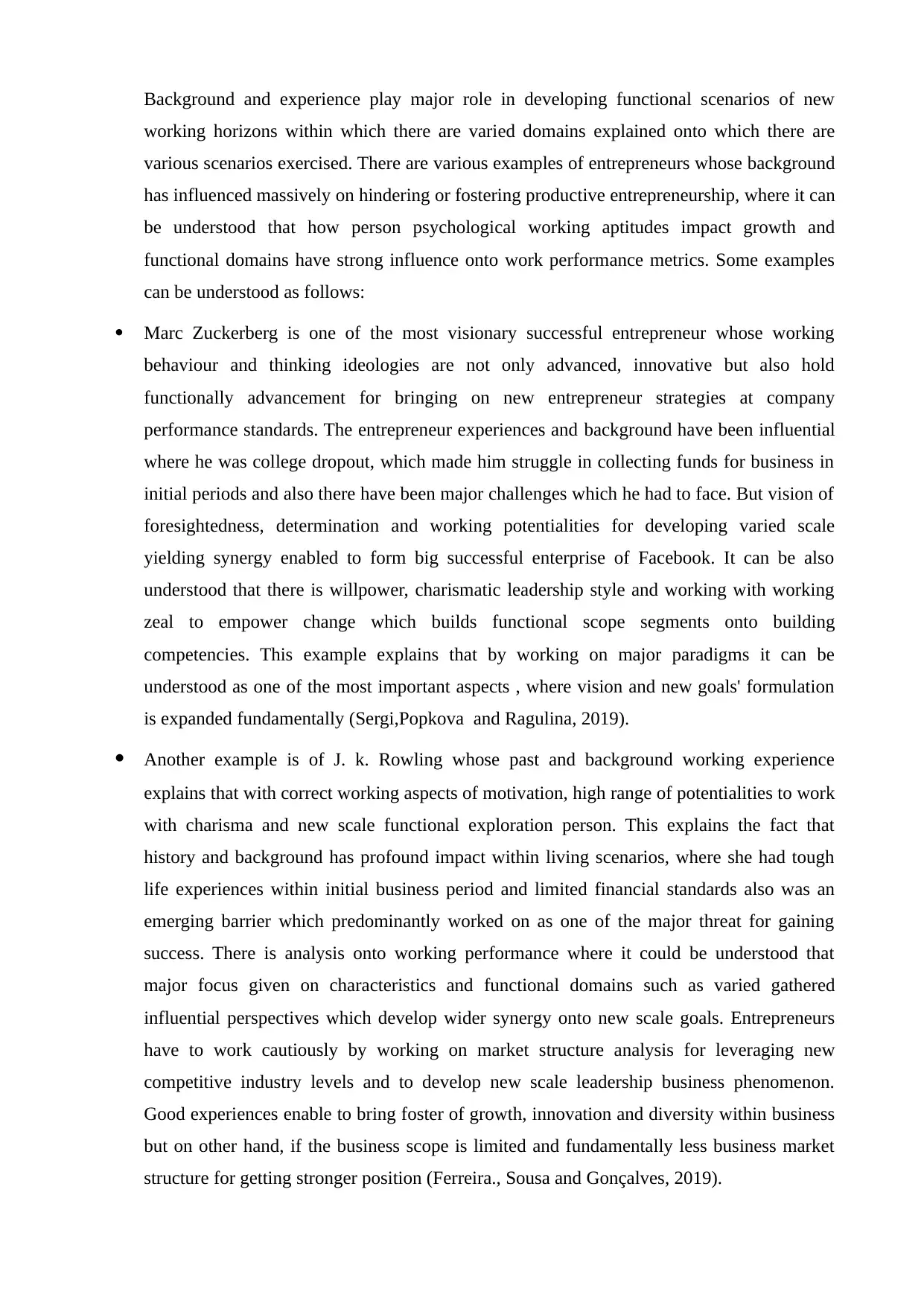
Background and experience play major role in developing functional scenarios of new
working horizons within which there are varied domains explained onto which there are
various scenarios exercised. There are various examples of entrepreneurs whose background
has influenced massively on hindering or fostering productive entrepreneurship, where it can
be understood that how person psychological working aptitudes impact growth and
functional domains have strong influence onto work performance metrics. Some examples
can be understood as follows:
Marc Zuckerberg is one of the most visionary successful entrepreneur whose working
behaviour and thinking ideologies are not only advanced, innovative but also hold
functionally advancement for bringing on new entrepreneur strategies at company
performance standards. The entrepreneur experiences and background have been influential
where he was college dropout, which made him struggle in collecting funds for business in
initial periods and also there have been major challenges which he had to face. But vision of
foresightedness, determination and working potentialities for developing varied scale
yielding synergy enabled to form big successful enterprise of Facebook. It can be also
understood that there is willpower, charismatic leadership style and working with working
zeal to empower change which builds functional scope segments onto building
competencies. This example explains that by working on major paradigms it can be
understood as one of the most important aspects , where vision and new goals' formulation
is expanded fundamentally (Sergi,Popkova and Ragulina, 2019).
Another example is of J. k. Rowling whose past and background working experience
explains that with correct working aspects of motivation, high range of potentialities to work
with charisma and new scale functional exploration person. This explains the fact that
history and background has profound impact within living scenarios, where she had tough
life experiences within initial business period and limited financial standards also was an
emerging barrier which predominantly worked on as one of the major threat for gaining
success. There is analysis onto working performance where it could be understood that
major focus given on characteristics and functional domains such as varied gathered
influential perspectives which develop wider synergy onto new scale goals. Entrepreneurs
have to work cautiously by working on market structure analysis for leveraging new
competitive industry levels and to develop new scale leadership business phenomenon.
Good experiences enable to bring foster of growth, innovation and diversity within business
but on other hand, if the business scope is limited and fundamentally less business market
structure for getting stronger position (Ferreira., Sousa and Gonçalves, 2019).
working horizons within which there are varied domains explained onto which there are
various scenarios exercised. There are various examples of entrepreneurs whose background
has influenced massively on hindering or fostering productive entrepreneurship, where it can
be understood that how person psychological working aptitudes impact growth and
functional domains have strong influence onto work performance metrics. Some examples
can be understood as follows:
Marc Zuckerberg is one of the most visionary successful entrepreneur whose working
behaviour and thinking ideologies are not only advanced, innovative but also hold
functionally advancement for bringing on new entrepreneur strategies at company
performance standards. The entrepreneur experiences and background have been influential
where he was college dropout, which made him struggle in collecting funds for business in
initial periods and also there have been major challenges which he had to face. But vision of
foresightedness, determination and working potentialities for developing varied scale
yielding synergy enabled to form big successful enterprise of Facebook. It can be also
understood that there is willpower, charismatic leadership style and working with working
zeal to empower change which builds functional scope segments onto building
competencies. This example explains that by working on major paradigms it can be
understood as one of the most important aspects , where vision and new goals' formulation
is expanded fundamentally (Sergi,Popkova and Ragulina, 2019).
Another example is of J. k. Rowling whose past and background working experience
explains that with correct working aspects of motivation, high range of potentialities to work
with charisma and new scale functional exploration person. This explains the fact that
history and background has profound impact within living scenarios, where she had tough
life experiences within initial business period and limited financial standards also was an
emerging barrier which predominantly worked on as one of the major threat for gaining
success. There is analysis onto working performance where it could be understood that
major focus given on characteristics and functional domains such as varied gathered
influential perspectives which develop wider synergy onto new scale goals. Entrepreneurs
have to work cautiously by working on market structure analysis for leveraging new
competitive industry levels and to develop new scale leadership business phenomenon.
Good experiences enable to bring foster of growth, innovation and diversity within business
but on other hand, if the business scope is limited and fundamentally less business market
structure for getting stronger position (Ferreira., Sousa and Gonçalves, 2019).
Paraphrase This Document
Need a fresh take? Get an instant paraphrase of this document with our AI Paraphraser
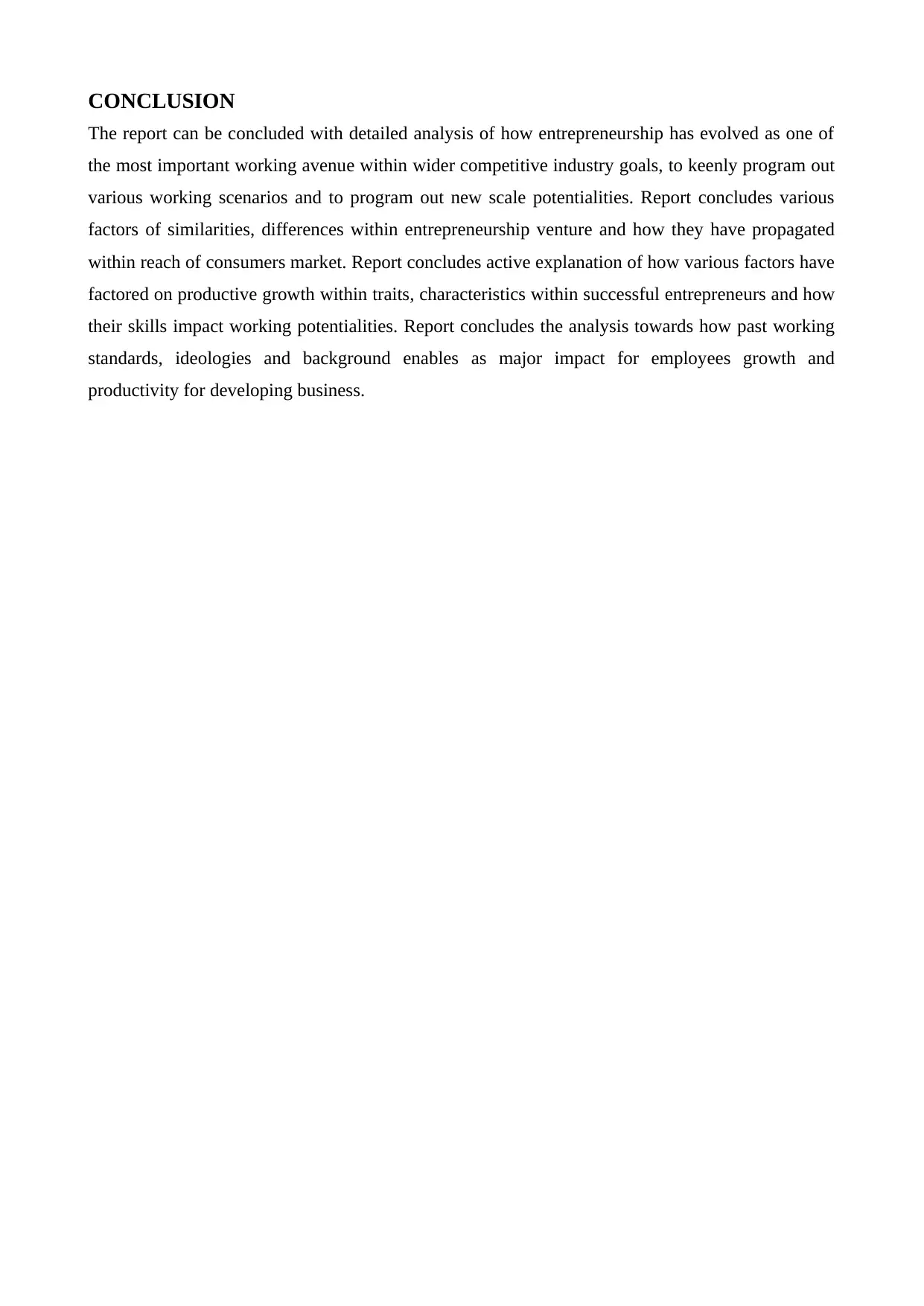
CONCLUSION
The report can be concluded with detailed analysis of how entrepreneurship has evolved as one of
the most important working avenue within wider competitive industry goals, to keenly program out
various working scenarios and to program out new scale potentialities. Report concludes various
factors of similarities, differences within entrepreneurship venture and how they have propagated
within reach of consumers market. Report concludes active explanation of how various factors have
factored on productive growth within traits, characteristics within successful entrepreneurs and how
their skills impact working potentialities. Report concludes the analysis towards how past working
standards, ideologies and background enables as major impact for employees growth and
productivity for developing business.
The report can be concluded with detailed analysis of how entrepreneurship has evolved as one of
the most important working avenue within wider competitive industry goals, to keenly program out
various working scenarios and to program out new scale potentialities. Report concludes various
factors of similarities, differences within entrepreneurship venture and how they have propagated
within reach of consumers market. Report concludes active explanation of how various factors have
factored on productive growth within traits, characteristics within successful entrepreneurs and how
their skills impact working potentialities. Report concludes the analysis towards how past working
standards, ideologies and background enables as major impact for employees growth and
productivity for developing business.
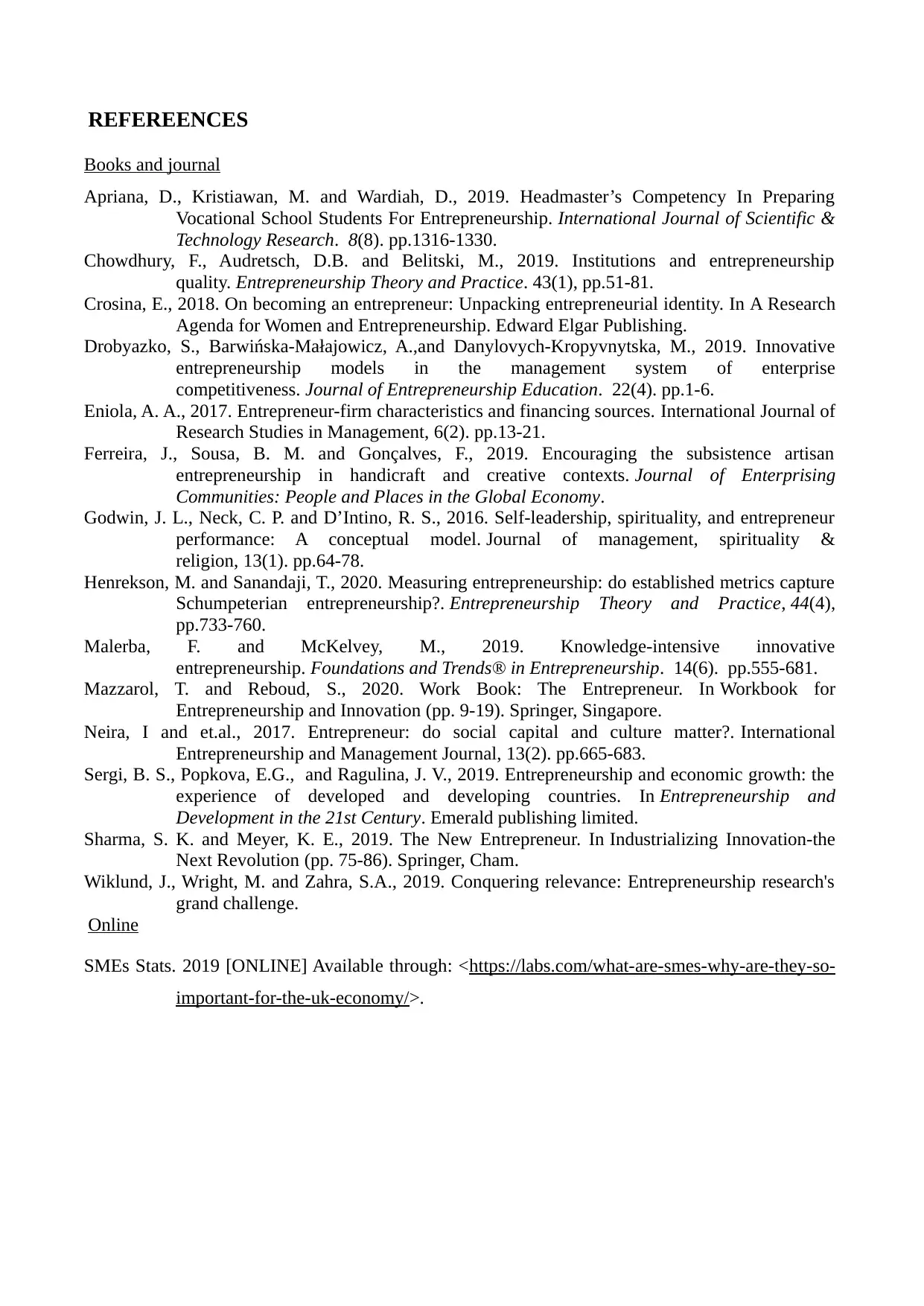
REFEREENCES
Books and journal
Apriana, D., Kristiawan, M. and Wardiah, D., 2019. Headmaster’s Competency In Preparing
Vocational School Students For Entrepreneurship. International Journal of Scientific &
Technology Research. 8(8). pp.1316-1330.
Chowdhury, F., Audretsch, D.B. and Belitski, M., 2019. Institutions and entrepreneurship
quality. Entrepreneurship Theory and Practice. 43(1), pp.51-81.
Crosina, E., 2018. On becoming an entrepreneur: Unpacking entrepreneurial identity. In A Research
Agenda for Women and Entrepreneurship. Edward Elgar Publishing.
Drobyazko, S., Barwińska-Małajowicz, A.,and Danylovych-Kropyvnytska, M., 2019. Innovative
entrepreneurship models in the management system of enterprise
competitiveness. Journal of Entrepreneurship Education. 22(4). pp.1-6.
Eniola, A. A., 2017. Entrepreneur-firm characteristics and financing sources. International Journal of
Research Studies in Management, 6(2). pp.13-21.
Ferreira, J., Sousa, B. M. and Gonçalves, F., 2019. Encouraging the subsistence artisan
entrepreneurship in handicraft and creative contexts. Journal of Enterprising
Communities: People and Places in the Global Economy.
Godwin, J. L., Neck, C. P. and D’Intino, R. S., 2016. Self-leadership, spirituality, and entrepreneur
performance: A conceptual model. Journal of management, spirituality &
religion, 13(1). pp.64-78.
Henrekson, M. and Sanandaji, T., 2020. Measuring entrepreneurship: do established metrics capture
Schumpeterian entrepreneurship?. Entrepreneurship Theory and Practice, 44(4),
pp.733-760.
Malerba, F. and McKelvey, M., 2019. Knowledge-intensive innovative
entrepreneurship. Foundations and Trends® in Entrepreneurship. 14(6). pp.555-681.
Mazzarol, T. and Reboud, S., 2020. Work Book: The Entrepreneur. In Workbook for
Entrepreneurship and Innovation (pp. 9-19). Springer, Singapore.
Neira, I and et.al., 2017. Entrepreneur: do social capital and culture matter?. International
Entrepreneurship and Management Journal, 13(2). pp.665-683.
Sergi, B. S., Popkova, E.G., and Ragulina, J. V., 2019. Entrepreneurship and economic growth: the
experience of developed and developing countries. In Entrepreneurship and
Development in the 21st Century. Emerald publishing limited.
Sharma, S. K. and Meyer, K. E., 2019. The New Entrepreneur. In Industrializing Innovation-the
Next Revolution (pp. 75-86). Springer, Cham.
Wiklund, J., Wright, M. and Zahra, S.A., 2019. Conquering relevance: Entrepreneurship research's
grand challenge.
Online
SMEs Stats. 2019 [ONLINE] Available through: <https://labs.com/what-are-smes-why-are-they-so-
important-for-the-uk-economy/>.
Books and journal
Apriana, D., Kristiawan, M. and Wardiah, D., 2019. Headmaster’s Competency In Preparing
Vocational School Students For Entrepreneurship. International Journal of Scientific &
Technology Research. 8(8). pp.1316-1330.
Chowdhury, F., Audretsch, D.B. and Belitski, M., 2019. Institutions and entrepreneurship
quality. Entrepreneurship Theory and Practice. 43(1), pp.51-81.
Crosina, E., 2018. On becoming an entrepreneur: Unpacking entrepreneurial identity. In A Research
Agenda for Women and Entrepreneurship. Edward Elgar Publishing.
Drobyazko, S., Barwińska-Małajowicz, A.,and Danylovych-Kropyvnytska, M., 2019. Innovative
entrepreneurship models in the management system of enterprise
competitiveness. Journal of Entrepreneurship Education. 22(4). pp.1-6.
Eniola, A. A., 2017. Entrepreneur-firm characteristics and financing sources. International Journal of
Research Studies in Management, 6(2). pp.13-21.
Ferreira, J., Sousa, B. M. and Gonçalves, F., 2019. Encouraging the subsistence artisan
entrepreneurship in handicraft and creative contexts. Journal of Enterprising
Communities: People and Places in the Global Economy.
Godwin, J. L., Neck, C. P. and D’Intino, R. S., 2016. Self-leadership, spirituality, and entrepreneur
performance: A conceptual model. Journal of management, spirituality &
religion, 13(1). pp.64-78.
Henrekson, M. and Sanandaji, T., 2020. Measuring entrepreneurship: do established metrics capture
Schumpeterian entrepreneurship?. Entrepreneurship Theory and Practice, 44(4),
pp.733-760.
Malerba, F. and McKelvey, M., 2019. Knowledge-intensive innovative
entrepreneurship. Foundations and Trends® in Entrepreneurship. 14(6). pp.555-681.
Mazzarol, T. and Reboud, S., 2020. Work Book: The Entrepreneur. In Workbook for
Entrepreneurship and Innovation (pp. 9-19). Springer, Singapore.
Neira, I and et.al., 2017. Entrepreneur: do social capital and culture matter?. International
Entrepreneurship and Management Journal, 13(2). pp.665-683.
Sergi, B. S., Popkova, E.G., and Ragulina, J. V., 2019. Entrepreneurship and economic growth: the
experience of developed and developing countries. In Entrepreneurship and
Development in the 21st Century. Emerald publishing limited.
Sharma, S. K. and Meyer, K. E., 2019. The New Entrepreneur. In Industrializing Innovation-the
Next Revolution (pp. 75-86). Springer, Cham.
Wiklund, J., Wright, M. and Zahra, S.A., 2019. Conquering relevance: Entrepreneurship research's
grand challenge.
Online
SMEs Stats. 2019 [ONLINE] Available through: <https://labs.com/what-are-smes-why-are-they-so-
important-for-the-uk-economy/>.
⊘ This is a preview!⊘
Do you want full access?
Subscribe today to unlock all pages.

Trusted by 1+ million students worldwide
1 out of 12
Related Documents
Your All-in-One AI-Powered Toolkit for Academic Success.
+13062052269
info@desklib.com
Available 24*7 on WhatsApp / Email
![[object Object]](/_next/static/media/star-bottom.7253800d.svg)
Unlock your academic potential
Copyright © 2020–2025 A2Z Services. All Rights Reserved. Developed and managed by ZUCOL.





